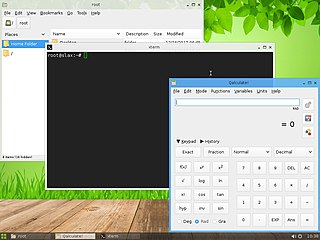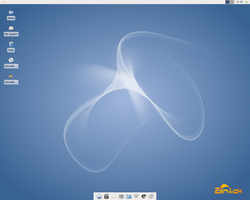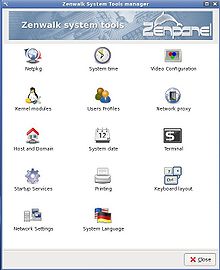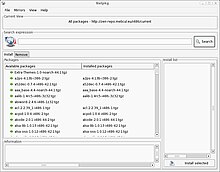
A Linux distribution is an operating system made from a software collection that includes the Linux kernel and often a package management system. Linux users usually obtain their operating system by downloading one of the Linux distributions, which are available for a wide variety of systems ranging from embedded devices and personal computers to powerful supercomputers.

Mandriva Linux is a discontinued Linux distribution developed by Mandriva S.A.

Slackware is a Linux distribution created by Patrick Volkerding in 1993. Originally based on Softlanding Linux System (SLS), Slackware has been the basis for many other Linux distributions, most notably the first versions of SUSE Linux distributions, and is the oldest distribution that is still maintained.

Slax is a LiveCD Linux distribution developed by Tomáš Matějíček and based on upstream customizable Linux distributions. Packages can be added by apt package manager or can be prepared as modules. The tagline for Slax refers to itself as "your pocket operating system".

PCLinuxOS, often shortened to PCLOS, is a rolling release Linux distribution for x86-64 computers, with KDE Plasma, MATE, and XFCE as its default user interfaces. It is a primarily FOSS operating system for personal computers aimed at ease of use.
Puppy Linux is an operating system and family of light-weight Linux distributions that focus on ease of use and minimal memory footprint. The entire system can be run from random-access memory (RAM) with current versions generally taking up about 600 MB (64-bit), 300 MB (32-bit), allowing the boot medium to be removed after the operating system has started. Applications such as AbiWord, Gnumeric and MPlayer are included, along with a choice of lightweight web browsers and a utility for downloading other packages. The distribution was originally developed by Barry Kauler and other members of the community, until Kauler retired in 2013. The tool Woof can build a Puppy Linux distribution from the binary packages of other Linux distributions.

VectorLinux, abbreviated VL, is a Linux distribution for the x86 platform based on the Slackware Linux distribution, originally developed by Canadian developers Robert S. Lange and Darell Stavem. Since version 7 the Standard Edition is also available for the x86-64 platform, known as VLocity64 7.

Frugalware Linux has been a general-purpose Linux distribution designed for intermediate users who are familiar with command-line operations. Early versions were based on Slackware, but it later became an independently developed distribution. Frugalware made use of the Pacman package management system from Arch Linux.

Pardus is a Linux distribution developed with support from the government of Turkey. Pardus' main focus is office-related work including use in Turkish government agencies. Despite that, Pardus ships in several languages. Its ease of use and availability free of charge has spawned numerous communities throughout the world.
KateOS was a Linux distribution originally based on Slackware. It was designed for intermediate users. Its package management system used so called TGZex (.tgz) packages, which unlike Slackware packages support dependency tracking (optional), internationalized descriptions, and were designed for ease of update. There were two native tools for package management: PKG and Updateos. The last version released was KateOS III (3.6), including as a Live CD, in 2007.

Korora was a remix of the Fedora Linux distribution. Originally Kororaa was a binary installation method for Gentoo Linux which aimed for easy installation of a Gentoo system by using install scripts instead of manual configuration. The name derives from the Māori word kororā – the little penguin.
SUSE Linux is a computer operating system developed by SUSE. It is built on top of the free and open-source Linux kernel and is distributed with system and application software from other open source projects. SUSE Linux is of German origin, its name being an acronym of "Software und System-Entwicklung", and it was mainly developed in Europe. The first version appeared in early 1994, making SUSE one of the oldest existing commercial distributions. It is known for its YaST configuration tool.

NimbleX is a small Slackware-based Linux distribution optimized to run from a CD, USB drive or a network environment. NimbleX has been praised for how fast it boots, as well as for its small disk footprint, which is considered surprising for a distribution using KDE as desktop environment. NimbleX was also remarked for its website that allows users to generate custom bootable images by using a web browser. It was also covered in mainstream Romanian press as the first Linux distribution put together by a Romanian.
Parsix GNU/Linux was a live-CD Linux distribution based on Debian. The Parsix project's goal was to provide a ready-to-use, easy-to-install, desktop and laptop-optimized operating system based on Debian's testing branch and the latest stable release of GNOME. It was possible to install extra software packages from the project's own APT repositories.

Salix OS is a multi-purpose Linux distribution based on Slackware.

Porteus is a portable operating system based on Slackware. It does not require installation and can be run from fixed and removable media, such as a USB flash drive or compact disc.

Chakra was a Linux distribution originally based on Arch Linux and focused on KDE software, intending to provide a KDE/Qt minimizing use of other widget toolkits where possible. It was well received by critics during its existence.

Mageia is a Linux-based operating system, distributed as free and open-source software. It was forked from the Mandriva Linux distribution. The Greek term mageía (μαγεία) means enchantment, fascination, glamour, wizardry.

Platypux was a French Linux distribution of the Slackware family, developed by Pierre-Aimé and Jacques-Olivier.


















